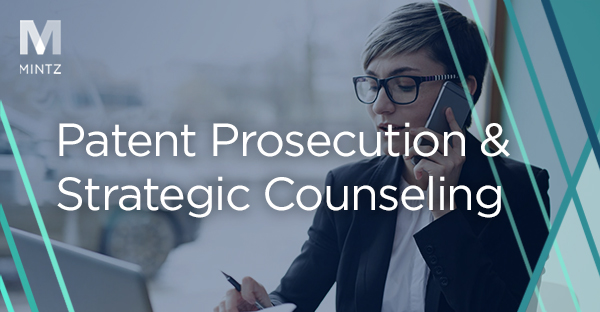
Intellectual Property
Viewpoints
Filter by:
Upon Reconsideration, E.D.Tex. Judge Affirms Ericsson’s Previously-Vacated Jury Award Against TCL
May 16, 2018 | Blog | By Michael Renaud, Andrew DeVoogd, Daniel Weinger, Robert Moore
On May 10, 2018, Magistrate Judge Payne reconsidered his previous March 2018 order which had vacated a jury award, and granted plaintiff Ericsson’s motion for reconsideration. The May ruling makes clear that the accused infringer bears the burden of production for royalty-stacking and other mitigatory arguments on damages.
Read more
Venue Cannot Be Bootstrapped to a Defendant that Only “Works Closely” with a Resident Corporate Relative Co-Defendant
May 15, 2018 | Blog | By Andrew DeVoogd, Anthony Faillaci
Further to our ongoing coverage of post-TC Heartland patent litigation, in a recent case in the Western District of Wisconsin, the court granted defendants' motion to transfer for improper venue. In doing so, it rejected the plaintiff’s contention that venue can be proper where one corporation “works closely” with another corporation resident in the jurisdiction.
Read more
ITC Updates Its Rules of Practice and Procedure to Increase Speed and Efficiency
May 11, 2018 | Blog | By Daniel Weinger
On Tuesday, May 8, 2018, the International Trade Commission (“ITC” or the “Commission”) published the final changes to its rules of practice and procedure. The Commission stated that the changes are intended to both modernize and simplify Commission practice as well as to increase the speed and efficiency of investigations.
Read more
USPTO Proposes Claim Construction Rule Change from BRI to Phillips in AIA Review Proceedings
May 9, 2018 | Blog | By Michael Newman, Peter Cuomo
The U.S. Patent and Trademark Office announced a propose change to the standard for construing both unexpired and amended patent claims in Patent Trial and Appeal Board (PTAB) proceedings under the America Invents Act (“AIA”).
Read more
Post-Grant Review Chickens Come Home to Roost: The Federal Circuit Clarifies the Effect of Reexamination on Equitable Estoppel and Laches
May 9, 2018 | Blog | By Andrew DeVoogd, Anthony Faillaci
The Federal Circuit recently overturned a decision estopping the plaintiff from pursuing its infringement claims in the United States District Court for the Eastern District of Arkansas, and clarified the effect of reexamination on equitable estoppel and laches.
Read more
Chat with the Chief on SAS Institute
May 4, 2018 | Blog | By Michael Renaud, Sandra Badin, Inna Dahlin
As we noted in our blog post last week, the USPTO held its “Chat with the Chief on SAS” webinar on April 30, 2018, to advise the public on the implications of the Supreme Court’s opinion in SAS Institute for practice before the Board going forward.
Read more
International Trade Commission Clarifies the Intersection Between Litigation Funding Agreements and Standing
April 27, 2018 | Blog | By Andrew DeVoogd, Daniel Weinger
On April 18, 2018, the International Trade Commission (“Commission”) reversed an Administrative Law Judge’s (“ALJ”) finding that a litigation funding agreement destroyed standing for a complainant at the ITC.
Read more
Two Supreme Court Patent Opinions and a Memo from the PTO
April 27, 2018 | Blog | By Michael Renaud, James Wodarski, Sandra Badin, Anthony Faillaci
On Tuesday, the U.S. Supreme Court issued two important patent law opinions that relate to the inter partes review procedure introduced by the America Invents Act: Oil States Energy Servs., LLC v. Greene’s Energy Grp., LLC, which upholds the constitutionality of inter partes review, and SAS Institute, Inc. v. Iancu, which requires the Patent Trial and Appeal Board to adjudicate the validity all patent claims challenged in a petition for inter partes review if the Board decides to adjudicate the validity of any claim challenged in that petition.
Read more
Federal Circuit Provides Guidance for Stereochemistry Claim Construction
April 25, 2018 | Blog | By Adam Samansky, Joe Rutkowski
On April 16, 2018 in a precedential opinion, the United States Court of Appeals for the Federal Circuit, Sumitomo Dainippon Pharma v. Emcure Pharms., Nos. 2017-1798, -1799, -1800, affirmed the United States District Court for the District of New Jersey by construing the claimed chemical structure diagram to encompass at least the specific enantiomer depicted, refusing to limit the claim to only cover a racemic mixture of the (+) and (–) enantiomers, absent clear indication that the depicted enantiomer should be excluded from the claim.
Read more
With Software Patents and Means-Plus-Function, “Structure” Takes On a New Meaning
April 17, 2018 | Blog
Software patents are generally directed to a sequence of steps or rules, i.e., an algorithm, performed by a computer programmed to carry out the algorithm. Because algorithms are inherently functional in nature, software patent claims are frequently written using functional, as opposed to structural, terms.
Read more
What is blockchain and how will it affect me?
April 11, 2018 | Blog | By Lisa Adams
The term “blockchain” is everywhere, and it is likely that you will interact with blockchain technology every day in the years to come.
Read more
USPTO Prepares to Celebrate the Issuance of the Ten Millionth U.S. Patent
April 9, 2018 | Blog | By William B. Kezer
The United States Patent and Trademark Office (USPTO) anticipates issuing the 10 millionth utility patent at some point during the summer 2018.
Read more
District Court Grants Protection under DTSA Whistleblower Immunity for First Time
April 6, 2018 | Blog | By Michael Renaud, Nick Armington
The Eastern District of Pennsylvania recently granted immunity under the whistleblower provision of the Defend Trade Secret Act in what appears to be the first decision of its kind under the new federal trade secret statute.
Read more
WesternGeco v. ION Geophysical Corp. and Lost Profit Damages under § 271(f)
April 5, 2018 | Blog | By Adam Samansky, Alexander Roan
Section 271 of Title 35 of the United States Code is the statute that codifies unlawful acts of patent infringement. The most commonly asserted provisions are § 271(a) (direct infringement), § 271(b) (induced infringement), and § 271(c) (contributory infringement).
Read more
Patent Damages: How Many Essential Features in a Smart Phone?
March 30, 2018 | Blog | By Michael Renaud, Andrew DeVoogd, Daniel Weinger
On March 20, 2018, the public version of Eastern District of Texas Magistrate Judge Roy Payne’s March 7, 2018 order tossing a $75 million jury verdict obtained by Ericsson against TCL Communication was released.
Read more
Doctrine of “Ancillary Venue” Does Not Trump TC Heartland
March 28, 2018 | Blog | By Andrew DeVoogd, Anthony Faillaci
Further to our ongoing coverage of post-TC Heartland patent litigation, in a recent development from the Northern District of Illinois, the court granted counterclaim defendants’ motion to dismiss for improper venue.
Read more
Berkheimer v. HP Inc.: Whether Claim Elements Are Well-Known, Routine, or Conventional Is a Question of Fact
March 12, 2018 | Blog | By Michael Newman, Kevin Amendt
The Court of Appeals for the Federal Circuit ruled in February that it was wrong for a judge to rule that a patent was ineligible under the Alice standard because there were underlying factual disputes that could not be resolved on summary judgement.
Read more
Automated Tracking Solutions, LLC v. The Coca-Cola Company
March 5, 2018 | Blog
Automated Tracking Solutions, LLC, (“ATS”) appealed findings of invalidity for failing to claim patent-eligible subject matter by the United States District Court for the Northern District of Georgia.
Read more
Establishing Obviousness: A Fundamental Case of Evidence Over Arguments
March 1, 2018 | Blog | By Brad M Scheller
The Federal Circuit affirmed the Patent Trial and Appeal Board’s inter partes review decision declaring various claims of patent owner Thales’ U.S. Patent No. 6,474,159 (“the ‘159 patent”) nonobvious.
Read more
Latest Tool in the Fight against Alice: USPTO Publishes a New Eligibility Quick Reference Sheet
February 26, 2018 | Blog | By Christina Sperry, Kevin Amendt
Struggling to keep case law relating to subject matter eligibility organized? In February 2018, the United States Patent and Trademark Office (USPTO) released an improved Eligibility Quick Reference Sheet, providing patent practitioners with a useful tool for analyzing claims in view of 35 U.S.C. § 101 subject matter eligibility requirements.
Read more
Explore Other Viewpoints:
- Data Centers & Digital Infrastructure
- AI: The Washington Report
- Antitrust and Federal Regulation
- Appellate
- Arbitration, Mediation & Alternate Dispute Resolution
- Artificial Intelligence
- Awards
- Bankruptcy & Restructuring
- California Land Use
- Cannabis
- Class Action
- Complex Commercial Litigation
- Construction
- Consumer Product Safety
- Corporate Governance (ESG)
- Cross-Border Asset Recovery
- DEI Legal Developments
- Debt Financing
- Direct Investing (M&A)
- Diversity
- EB-5 Financing
- Education & Nonprofits
- Employment
- EnforceMintz
- Environmental (ESG)
- Environmental Enforcement Defense
- Environmental Law
- Environmental, Social, and Corporate Governance (ESG)
- FDA Regulatory
- FDA in Flux
- False Claims Act
- Federal Circuit Appeals
- Financial Institution Litigation
- Government Law
- Growth Equity
- Health Care
- Health Care Compliance, Fraud and Abuse, & Regulatory Counseling
- Health Care Enforcement & Investigations
- Health Care Transactions
- Health Information Privacy & Security
- IP Due Diligence
- IPRs & Other Post Grant Proceedings
- Immigration
- Impacts of a New US Administration
- Insolvency & Creditor Rights Litigation
- Institutional Investor Class Action Recovery
- Insurance & Financial Services
- Insurance Consulting & Risk Management
- Insurance and Reinsurance Problem-Solving & Dispute Resolution
- Intellectual Property
- Investment Funds
- Israel
- Licensing & Technology Transactions
- Life Sciences
- Litigation & Investigations
- M&A Litigation
- ML Strategies
- Managed Care
- Medicare, Medicaid and Commercial Coverage & Reimbursement
- Mergers & Acquisitions
- Patent Litigation
- Patent Prosecution & Strategic Counseling
- Pharmacy Benefits and PBM Contracting
- Portfolio Companies
- Privacy & Cybersecurity
- Private Client
- Private Equity
- Pro Bono
- Probate & Fiduciary Litigation
- Products Liability & Complex Tort
- Projects & Infrastructure
- Public Finance
- Real Estate Litigation
- Real Estate Transactions
- Real Estate, Construction & Infrastructure
- Retail & Consumer Products
- Securities & Capital Markets
- Securities Litigation
- Social (ESG)
- Special Purpose Acquisition Company (SPACs)
- Sports & Entertainment
- State Attorneys General
- Strategic IP Monetization & Licensing
- Sustainable Energy & Infrastructure
- Tax
- Technology
- Technology, Communications & Media
- Technology, Communications & Media Litigation
- Trade Secrets
- Trademark & Copyright
- Trademark Litigation
- Unified Patent Court (UPC)
- Value-Based Care
- Venture Capital & Emerging Companies
- White Collar Defense & Government Investigations
- Women's Health and Technology









